T-Mobile 'crazy in love' promotion of OnePlus 7 Pro tweeted from iPhone
It was so hard to contain the excitement of having #OfficiallySwitchedtoAndroid that even a media influencer working for T-Mobile forgot to actually use the BKK OnePlus 7 Pro she was "crazy in love with" and instead tweeted out her new device relationship status from her iPhone.
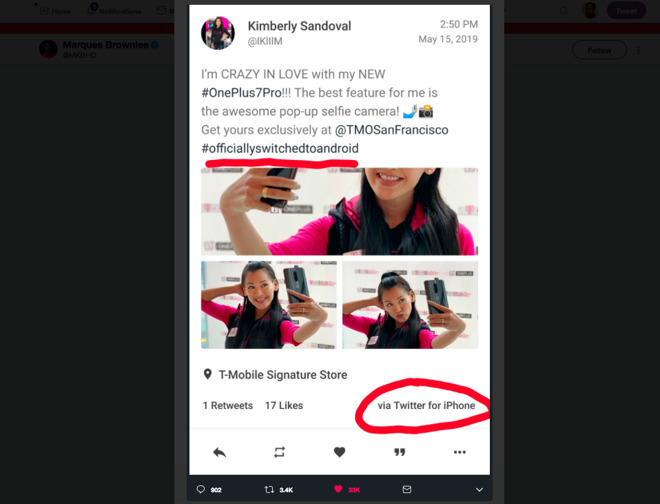
Marques Brownlee captured the T-Mobile tattle tweet
The promotion for the product, occurring at a San Francisco T-Mobile retail store, intended to draw attention to the device's "awesome pop-up selfie camera" and to suggest that the phone was exciting enough to have prompted Kimberly Sandoval to switch to Android. However, as Marques Brownlee noted, the tweet betrayed the hype with tattling metadata that showed the message was sent from Twitter on an iPhone.
The tweet was later removed and reposted without the metadata, but as the incident gained attention and comments on Twitter, the entire account was eventually taken offline.
Even a promotional New Year greeting from China's phone giant Huawei was tweeted out from an iPhone this January, just a few days after the international incident involving the arrest of Huawei's CFO Meng Wanzhou on fraud charges related to violating U.S. trade sanctions against Iran.
It was later revealed that Meng herself was carrying a full range of Apple products at the time of her arrest, including an iPhone, an iPad Pro, and a MacBook Air.
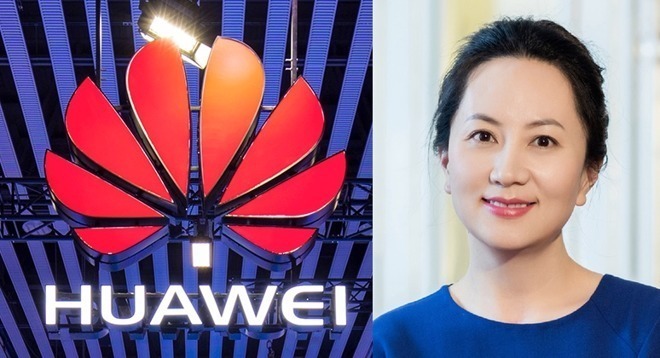
Huawei CFO Wanzhou Meng has Apple fever
Huawei quickly and savagely blamed and then demoted two low-level workers and cut their monthly salaries cut by 5,000 yuan, or about $728, for tweeting greetings from their iPhone. However, Meng was apparently not penalized for her more embarrassing publicity of the routine use of Apple gear by Huawei's top executives.
The bizarre media narrative portraying Huawei as a rising leader comes despite the rather obvious reality that most of us are still using iPhones, and nobody in the world's most affluent phone market can even buy a Huawei phone. We have no data showing that vast numbers of iOS users are abandoning Apple's platform in any region. In the U.S., U.K. and Japan, the installed base of iOS users is now reaching up to 60 and 75 percent.
In fact, even in China, we know that Apple's installed base of iPhone users is remaining solidly stable-- even growing slightly to closely rival Huawei in the March quarter, despite the reported surge in Huawei shipments globally.
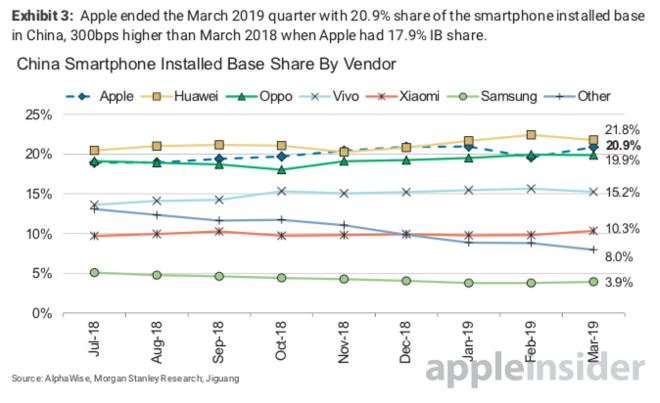
Source: Morgan Stanley
BKK, the maker of OnePlus phones, has seemingly avoided the scrutiny of Huawei. Beyond its upscale OnePlus brand, the Chinese company sells two other major brands, Vivo and Oppo. Market research companies puzzlingly refer to the three brands as if they are different companies, separating their sales in a way that portray Huawei as China's long-established leader in phone shipments.
IDC's most recent global smartphone market estimate, which was lambasted for making up "embarrassing" figures for Apple and presented numbers that Xiaomi insisted were "inaccurate and unfair," presented Oppo and Vivo shipments separately, without including figures for OnePlus.
As recently as 2017, IDC was offering a different perspective to anyone with $4,500: that BKK's Oppo brand was "The Rising Smartphone Giant" that was "challenging" Samsung and Apple with commodity Androids with features and designs that stood out. Yet a year and a half later, IDC is now reporting that Oppo is losing market share nearly as fast as Samsung. Was any of that ever true?
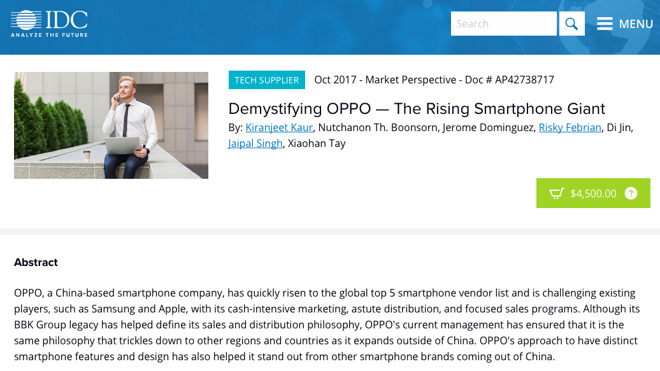
How time flies: Oppo was the Rising Smartphone Giant of late 2017
Added together, BKK's three brands would be larger than Xiaomi or Apple, and potentially ahead of Huawei. BKK's phone shipments were certainly ahead of Huawei a year ago, despite consistently being cut up into sub-brands that dilute its real market presence and call into question why IDC and other companies are advertising free data that appears to be sliced and diced into anything but a realistic portrayal of any sort of market reality.
What is real is that Apple is selling virtually all of the world's premium handsets that actually make any money. It's also earning virtually all of the global profits earned from smartphone sales.
A year ago, Huawei paid "Wonder Woman" actress Gal Gadot to serve as its brand ambassador for the high-end Mate 10 Pro, but the star posted her endorsement via her iPhone.
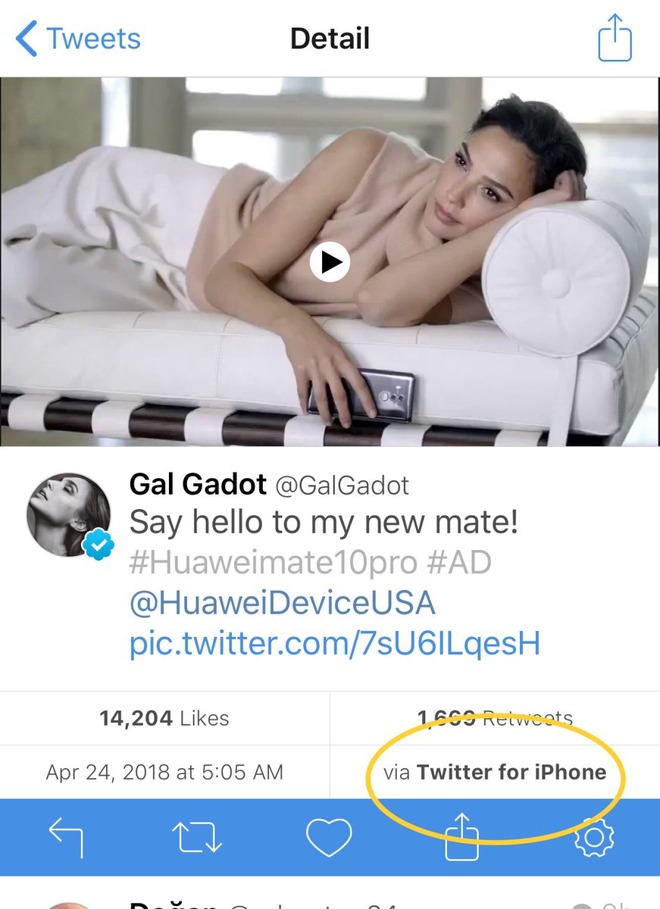
BKK is also no stranger to paying Apple users to claim that they use its products. The previous May, professional tennis player Sania Mirza tweeted out "Not rly a techie, but totally love using the OnePlus 3T the past few months. More in my story onepl.us/a5 #oneplusstarcommunity." That too was sent from an iPhone.
In March 2013, after the Chinese government's CCTV propaganda channel began airing reports stating that Apple was "biased against Chinese consumers in its warranty and customer service policies," a series of orchestrated tweets on China's Sina Weibo from various celebrities and other well known personalities voiced unison disapproval of Apple on cue after the broadcast, many of which were sent from iPad and iPhones.
At the height of Peak Galaxy, Samsung created a fantasy soccer league in 2013 intended to "combine fans' universal love for football and GALAXY devices," but then the legendary leader of its fantasy team Franz Beckenbauer tweeted his canned endorsement from his iPhone.
Shortly afterward in April, Spanish tennis player David Ferrer tweeted his satisfaction with his #GalaxyS4 and that he was "configuring S Health on my new #GalaxyS4 to help with training @SamsungMobile," all via Twitter, que contento estoy con mi iPhone.
Just prior to that, the chief executive of T-Mobile, John Legere, intended to use Twitter to direct attention to Samsung Mobile's latest Note 3 phablet, but inadvertently did so via his iPhone 5s.
It hasn't just been Android getting fake praise from iOS users. In 2012, Oprah Winfrey used an iPad to send out tweets endorsing Microsoft's Surface, using the hashtag "#FavoriteThings" to say she had bought a dozen of them for Christmas gifts.
In 2011, after BlackBerry paid Alicia Keys to serve as its Creative Director, she sent a personal tweet from her iPhone in February, then removed it and claimed her account had been "hacked."

Marques Brownlee captured the T-Mobile tattle tweet
The promotion for the product, occurring at a San Francisco T-Mobile retail store, intended to draw attention to the device's "awesome pop-up selfie camera" and to suggest that the phone was exciting enough to have prompted Kimberly Sandoval to switch to Android. However, as Marques Brownlee noted, the tweet betrayed the hype with tattling metadata that showed the message was sent from Twitter on an iPhone.
The tweet was later removed and reposted without the metadata, but as the incident gained attention and comments on Twitter, the entire account was eventually taken offline.
To Tell iPhony
Tweeting out endorsements for Androids from iPhones has become a common practice because the people paid to pretend to use cheaper phones are typically not actually users of cheap phones. And they're frequently not even users of expensive Androids.Even a promotional New Year greeting from China's phone giant Huawei was tweeted out from an iPhone this January, just a few days after the international incident involving the arrest of Huawei's CFO Meng Wanzhou on fraud charges related to violating U.S. trade sanctions against Iran.
It was later revealed that Meng herself was carrying a full range of Apple products at the time of her arrest, including an iPhone, an iPad Pro, and a MacBook Air.

Huawei CFO Wanzhou Meng has Apple fever
Huawei quickly and savagely blamed and then demoted two low-level workers and cut their monthly salaries cut by 5,000 yuan, or about $728, for tweeting greetings from their iPhone. However, Meng was apparently not penalized for her more embarrassing publicity of the routine use of Apple gear by Huawei's top executives.
Huawei with words
Despite making headlines for its embarrassing security lapses, fraud charges, and its preference for iPhones, Huawei has oddly enough become a media darling. The same pundits who scoffed at Steve Jobs' portrayal of an upcoming Post PC future of computing are now evangelizing the idea that we are already in a "Post iPhone" world, where everyone has switched to a Huawei phone because nobody can afford a premium phone like Apple's latest $999+ models-- unless of course it's a $1,000 Huawei, in which case it's a bargain.The bizarre media narrative portraying Huawei as a rising leader comes despite the rather obvious reality that most of us are still using iPhones, and nobody in the world's most affluent phone market can even buy a Huawei phone. We have no data showing that vast numbers of iOS users are abandoning Apple's platform in any region. In the U.S., U.K. and Japan, the installed base of iOS users is now reaching up to 60 and 75 percent.
In fact, even in China, we know that Apple's installed base of iPhone users is remaining solidly stable-- even growing slightly to closely rival Huawei in the March quarter, despite the reported surge in Huawei shipments globally.

Source: Morgan Stanley
Taking turns as the rising giant of Android
But facts don't matter when Huawei is trending as the brightest prospect in all of Androidland, effectively becoming the Xiaomi of 2019, or perhaps this year's Oppo. Regularly creating a new "leading brand" to carry the Android flag is important because there's an awful lot of failed Android heroes falling by the wayside.BKK, the maker of OnePlus phones, has seemingly avoided the scrutiny of Huawei. Beyond its upscale OnePlus brand, the Chinese company sells two other major brands, Vivo and Oppo. Market research companies puzzlingly refer to the three brands as if they are different companies, separating their sales in a way that portray Huawei as China's long-established leader in phone shipments.
IDC's most recent global smartphone market estimate, which was lambasted for making up "embarrassing" figures for Apple and presented numbers that Xiaomi insisted were "inaccurate and unfair," presented Oppo and Vivo shipments separately, without including figures for OnePlus.
As recently as 2017, IDC was offering a different perspective to anyone with $4,500: that BKK's Oppo brand was "The Rising Smartphone Giant" that was "challenging" Samsung and Apple with commodity Androids with features and designs that stood out. Yet a year and a half later, IDC is now reporting that Oppo is losing market share nearly as fast as Samsung. Was any of that ever true?

How time flies: Oppo was the Rising Smartphone Giant of late 2017
Added together, BKK's three brands would be larger than Xiaomi or Apple, and potentially ahead of Huawei. BKK's phone shipments were certainly ahead of Huawei a year ago, despite consistently being cut up into sub-brands that dilute its real market presence and call into question why IDC and other companies are advertising free data that appears to be sliced and diced into anything but a realistic portrayal of any sort of market reality.
What is real is that Apple is selling virtually all of the world's premium handsets that actually make any money. It's also earning virtually all of the global profits earned from smartphone sales.
Fake Use
Yet market research reports focusing on unit shipments-- which were earlier used to marginalize iPad and then to portray Apple Watch as a middling failure-- are nearly as commonplace as paid Android endorsements from celebrities who are still using iPhones. Companies licensing Android have a long history of eroding their own brand value by preferring to use iPhones to deliver their marketing messages.A year ago, Huawei paid "Wonder Woman" actress Gal Gadot to serve as its brand ambassador for the high-end Mate 10 Pro, but the star posted her endorsement via her iPhone.

BKK is also no stranger to paying Apple users to claim that they use its products. The previous May, professional tennis player Sania Mirza tweeted out "Not rly a techie, but totally love using the OnePlus 3T the past few months. More in my story onepl.us/a5 #oneplusstarcommunity." That too was sent from an iPhone.
In March 2013, after the Chinese government's CCTV propaganda channel began airing reports stating that Apple was "biased against Chinese consumers in its warranty and customer service policies," a series of orchestrated tweets on China's Sina Weibo from various celebrities and other well known personalities voiced unison disapproval of Apple on cue after the broadcast, many of which were sent from iPad and iPhones.
At the height of Peak Galaxy, Samsung created a fantasy soccer league in 2013 intended to "combine fans' universal love for football and GALAXY devices," but then the legendary leader of its fantasy team Franz Beckenbauer tweeted his canned endorsement from his iPhone.
Shortly afterward in April, Spanish tennis player David Ferrer tweeted his satisfaction with his #GalaxyS4 and that he was "configuring S Health on my new #GalaxyS4 to help with training @SamsungMobile," all via Twitter, que contento estoy con mi iPhone.
Just prior to that, the chief executive of T-Mobile, John Legere, intended to use Twitter to direct attention to Samsung Mobile's latest Note 3 phablet, but inadvertently did so via his iPhone 5s.
It hasn't just been Android getting fake praise from iOS users. In 2012, Oprah Winfrey used an iPad to send out tweets endorsing Microsoft's Surface, using the hashtag "#FavoriteThings" to say she had bought a dozen of them for Christmas gifts.
In 2011, after BlackBerry paid Alicia Keys to serve as its Creative Director, she sent a personal tweet from her iPhone in February, then removed it and claimed her account had been "hacked."

Comments
I think what astounds me most about Android is how bad a user experience the whole thing is. The UI is completely inconsistent and of course it does not even come close to Apple’s polish. A lot of this is due to the split personality problem that every Android device has: the manufacturer is responsible for some of the UI and apps, the carrier is responsible for others, and of course Google is responsible for the rest. I’ve mentioned in previous posts how the much heralded “customization” of Android is really just a lack of built-in features, so I won’t go into that here except to say it is like how a lot of car dealers today fail to tell you that a spare tire is no longer standard equipment. They spin a weakness as a strength: you can “customize” your car by buying any spare tire you want!
say it is unconscious tribute to Apple for his contribution to the society.
I am an AAPL shareholder, and I want Apple to succeed and grow, but there is no reason to slam and bash everything Android because that creates a false sense of security and helps Tim Cook and the rest of Apple leadership rest on their laurels while some real innovation happens on the Android side of the equation, which makes Android more and more compelling choice. This will become increasingly the case if - God forbid - the tariffs on Apple products materialize in the near future.
Those who continue to bash Android are basing their uneducated opinion on the Android (and Android handsets) of a decade ago. Pick up the modern Android phone (not a Samsung one) and spend a few days with it. You will see that Android today is a formidable alternative to the iPhone. Then, you will understand how badly Tim Cook is squandering the advantage that the iPhone once (and perhaps still) has had over Android. While Cook is innovating with Emojis, Animojis, and rainbow watch faces, Google is breathing Apple in the neck with their real innovations. A few examples are Google Maps, Google Assistant, and Android Auto. If Apple continues to remain complacent, I don't even want to think about what will happen to my investment portfolio.
I'm not a particular fan of Android myself, but I do have an Android phone that I use exclusively for Android Auto in my car. That phone stays in the car, as my family uses iPhones for everything else. I can tell you that the first time I picked up this Motorola Android phone two years ago, I was very pleasantly surprised. Did I like it more than the iPhone? No! However, it was a solid competitor to the iPhone IMHO. The reason I have that Android phone permanently plugged in my car is because Android Auto beats Car Play hands down as far as I'm concerned.
The first time I touched an Android phone was in 2009 - as soon as Android came out for general public availability in the US. I was switching from a flip phone to a smart phone, so I decided to compare the iPhone to an Android phone. I spent a few hours comparing them and I chose the iPhone (3Gs). I'm still choosing iPhone over Android, but I can tell you that it becomes more and more difficult for me to justify the cost of the iPhone, and now I know that Android is a real alternative to the iPhone and not a piece of garbage as Android is presented most of the time on this site.
As for the fact that Android UI was initially shamefully ripped off iOS and the fact that Android is highly fragmented is all true. The fact that developing for Android is much harder than for the iPhone is probably also true; I don't have a first-hand experience with that as I'm not a developer. However, I'm talking here from a consumer point of view, not from a developer point of view. For those who are not anchored in the Apple ecosystem, there is little reason to buy the iPhone nowadays. Unfortunately, at least half of iPhone owners don't use iCloud and use a lot of Google services, including Gmail, Google Calendar, Google Contacts, etc. It would be very easy for them to switch to Android if the iPhone continues to increase in price.
Regardless of how others see these messages delivered, I find them extremely sexual!
So no, I don’t know what these reasons to like the knockoffs is. To consumers it certainly ain’t your ideological position on open source software. Such intellectual debates offer no relieve to the daily problem of a poorly designed, unfriendly, shitty device. Have fun with open. How’s Linux these days? Linus still fired for being a tyrant?
The truth hurts you, huh? Android has always been junk, is still junk, and likely will remain junk.
You can’t argue the facts of this piece — even those people paid to endorse junk, can’t do it and continue to use their preferred iPhones. Because they’re better devices. Because these people don’t need to use cheap knockoffs when they can use the real thing.
Also, clueless points:
- emoji are a character set and are ratified by a committee, Apple only implements the characters, just like anybody else.
- Animoji are unique to Apple, and much fun. way better than the android knockoff versions (yep they fast followed that too)
- “rainbow watch faces” - nice jab at gays, what are you, homophobic? get real. The rainbow face is fun.
- Android Auto is now a threat? to CarPlay? to Apple? delusional.
...enjoy your crappy chinese knockoffs.
What the hay...? Well, sirozha, you win the prize for Stupidest Comment Today, if that’s what you were going for.
We are specifically discussing Android phones here. Whereas in the past Android phone looked and felt cheap, this is not necessarily the case today. There are some premium Android phones out there. Painting all Android phones with a broad brush as inferior plastic crap simply helps Apple become more complacent in their lack of innovation. This is the same mistake as dismissing all Wintel laptops nowadays as cheap plastic crap. Some of Wintels are very good and are a solid competition to Macs. Windows 10 is also much better than those who haven’t touched Windows in a decade believe it to be.